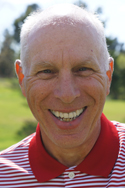
 Today Links Daily Devotional editor Jeff Hopper completes a 16-week round of chemotherapy treatments after a surgery in February to remove a second liposarcoma from his chest (his first surgeries and treatments in 2016 are documented in his book, My Hundred Helpers: The Provision of God through People). Meanwhile, Links Players Arizona region director Lewis Greer continues hormone treatments and follow-ups for prostate cancer first identified in summer 2015. Here the two “weakened warriors” talk about how their cancer treatments have robbed their strength on the golf course and how they have learned to enjoy the game anyway.
Today Links Daily Devotional editor Jeff Hopper completes a 16-week round of chemotherapy treatments after a surgery in February to remove a second liposarcoma from his chest (his first surgeries and treatments in 2016 are documented in his book, My Hundred Helpers: The Provision of God through People). Meanwhile, Links Players Arizona region director Lewis Greer continues hormone treatments and follow-ups for prostate cancer first identified in summer 2015. Here the two “weakened warriors” talk about how their cancer treatments have robbed their strength on the golf course and how they have learned to enjoy the game anyway.
Jeff: Did you find that it was harder for you to deal with the physical weakness or the changed expectations about how you could play?
Lewis: The hardest thing for me was dealing with the physical side of it. I refuse to deal with the changed expectations. My expectations virtually never went down. I knew in my heart that I could not play as well, mostly because I have lost distance, but the physical part was—I don’t think I’m over that.
Jeff: The expectations are hard to lose. Someday we are going to have to, right? We’re going to be 85 and our expectations are going to have to change, aren’t they?
Lewis: Yes.
Jeff: So why is it so hard temporarily?
Lewis: Well, that’s a great question. I think that I simply wasn’t ready for this. I think at some point I knew that I would have to do this, but I didn’t think I would have to now and I was telling someone the other day that it really came at an inconvenient time, and she said, “Is there a convenient time?” I said, “Probably not.” But I think that that was really my issue, that I simply wasn’t ready for this to happen now.
Jeff: You said that you had lost distance. I certainly have lost distance. Anything else that is noticeable or is that how it shows up, in the loss of distance?
I was telling someone the other day that it really came at an inconvenient time, and she said, “Is there a convenient time?”Lewis: It shows up two ways primarily. One is distance, which is obvious and sort of immediate. And the other is energy, which is lacking tremendously. I love to walk and carry; it is my primary way to play. And I find it very difficult to do that especially if there is any heat, which there often is here. So, I then moved to a push cart and even that sometimes is hard and I simply can’t do. I monitor myself better now better than I did for a while and I still believe that I will recover from these side effects, but it has taken much longer to recover than either the doctors or I had thought that it would. So, loss of distance—probably a full club on the irons and probably 20-30 yards on the driver.
Jeff: I might be 50 yards shorter with the driver, and what’s worse is that it is totally unpredictable. You know how it is. You think that you are making the same swing every time, but you’re not. For me right now it is maybe 20 yards different, 20 yards of lost distance when I hit it well. But it can be 70 yards lost distance when I miss it.
Lewis: The misses are magnified, aren’t they?
Jeff: Yeah, it’s no fun.
Lewis: Yeah, no fun. I’ll hit a shot and I’ll think, Wow, and I start to walk out after it and I’ll arrive much sooner than I thought I would.
Jeff: Yeah, much sooner, and now you can’t reach the par-4.
Lewis: Right. I am often hitting much longer clubs into par-4s than I am used to doing. It really is a challenge. The energy thing happens to me as I am playing, and I will have a couple of good friends, Links Players, that I play with on a regular basis and they will say on maybe twelve or thirteen, “That was a tired swing.” They can see it before I even recognize it. The good news is that this loss of distance has been very good for my short game.
Jeff: Oh, yeah.
Lewis: I still think I can hit and carry a 7-iron 150 yards and I carry it 133 yards and it bounces up. So I have to hit more short-game shots than I have ever had to hit before. Also, the energy shows up in my inability to spend much time on the driving range. So I spend a little bit more time in the short game area and there is much less effort to do that and it has probably a better reward. The good side is that if I get the energy back, get the length back and keep the short game, then I am going to be trouble.
Jeff: That would be nice! Forced carries, even just where I’ve got to carry it over a bunker to get to a flag, I can’t risk that anymore because I have no idea what is going to happen.
Lewis: I have found myself not aiming for the pin as much as aiming for someplace that I know will be safe even if it comes up short.
Jeff: Right. See for me I think I have found—and I have always liked this style of play anyway—but I think about playing along the ground. Maybe it used to be a 6-iron and now it is a 4-iron. I feel more comfortable hitting that as a punch-and-run 4-iron if the hole allows for it.
Lewis: Right, yes, like my friend Andrew Yun said when he played in this really windy tournament in the Bahamas: “Keep everything low and hit a lot of chip shots.” I got to thinking about that and, in effect, you and I playing into the wind.
Jeff: Yeah, effectively that is what we are doing in terms of thinking about our club choices.
Lewis: Right. So you keep the ball lower and play more of a ground game and more punch shots and it is more creative, and I think sometimes it is a lot of fun.
Jeff: It is, and you are actually playing the ball lower anyway because you can’t generate enough clubhead speed to really throw it up it up into the air like you would normally do.
Lewis: That is correct.
Jeff: So what we have come to is that the best thing for a weakened warrior is to move to the UK.
Lewis: (Laughs) Good idea. Play the links-style courses.
Jeff: Yeah, I mean, I guess you can look at it and say, if you are not a member of a particular club, “I used to play here, but I have started to play here because I can enjoy the game the way I am capable of playing it right now.”
Lewis: I think that that is a great idea.
Jeff: What else? Anything else about how you approach the game that is different because you just can’t muscle it out there anymore?
If I am going to have enough energy to get through 18 holes, I am going to have to ride, and that makes me more social right there.
Lewis: Well, I play a lot more social golf than I do competitive golf. Part of it has to do with my inability to play the game that I used to play. I have realized that I cannot be as competitive as I once was. And so that has been good for me because I have spent time thinking about the people that I am playing golf with and thinking about my own game and I worry much less about my own game than I once did. If I miss shots I know I am going to miss shots, that it is OK. I let it go a lot easier than I did once upon a time. And I brought the people that I play with in that world with me and they are happy to be there and happy to walk alongside me and help out and we all joke about it. I always say with no testosterone I should be able to play from the ladies’ tees and nobody ever lets me.
Jeff: Yeah.
Lewis: But we still joke about it and it’s still fun. So on the social side of it, that I would say has been a benefit from getting away from being so competitive on the golf course.
Jeff: I think it is more social for me right now because if I wasn’t riding I wouldn’t be playing. When you’re in a cart it’s always a more social game. I am walker normally like you, but right now I just can’t do that. If I am going to have enough energy to get through 18 holes, I am going to have to ride, and that makes me more social right there.
Lewis: Yes, yes. Right there, that is a good side of it. Of course, having an illness, having treatments, and recovering from both the illness and the treatments, it puts things in perspective for you. I still absolutely love the game. I think about it every day. I pick up a club every day, even if I don’t hit a ball every day, and I still want to improve. I actually took a lesson the other day and I paid for it which is, like, an amazing thing.
Jeff: Yeah.
Lewis: And partly what I was trying to do is find more length taking the swing back even though I don’t have strength. I can watch a little girl hit a ball and carry a ball 200 yards with her driver. You know I should have as much strength as her.
Jeff: Sure.
Lewis: At least once or twice! So I still care about it, but it does have a different place in my perspective.